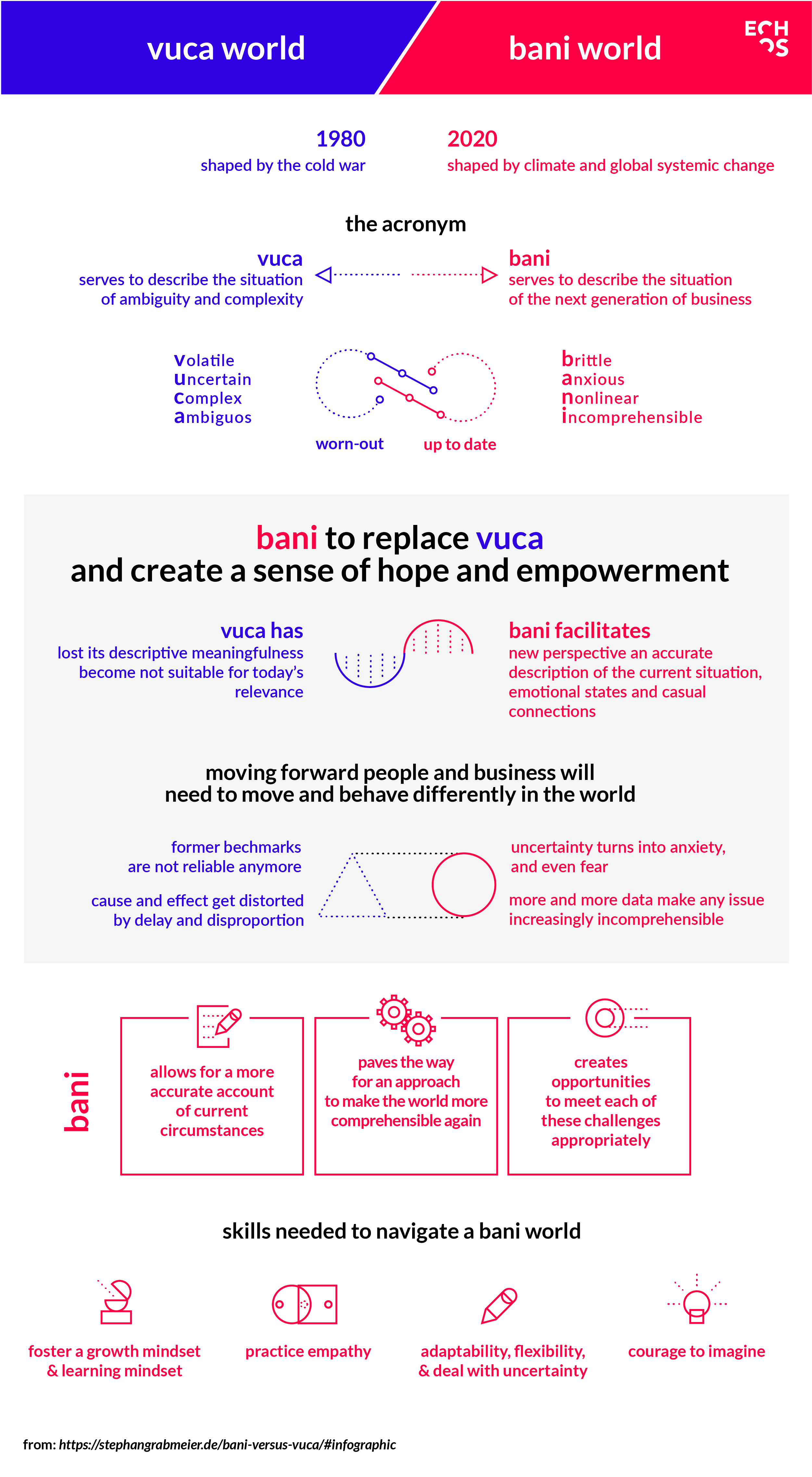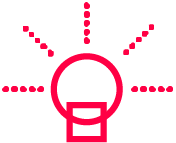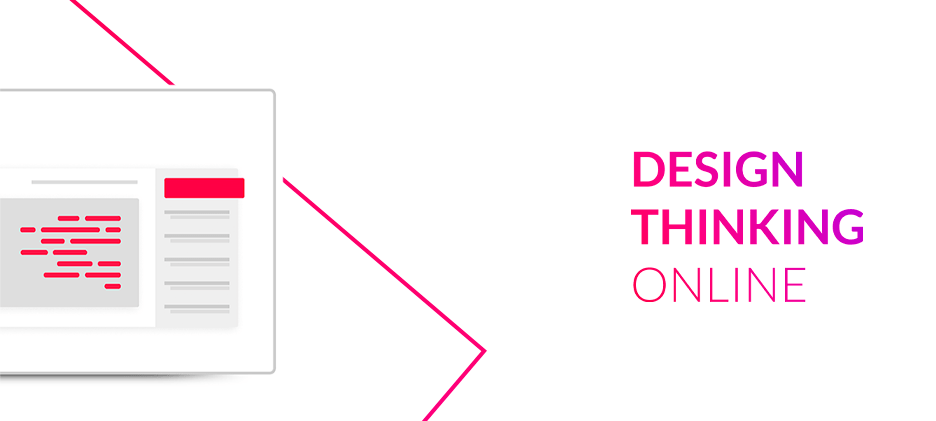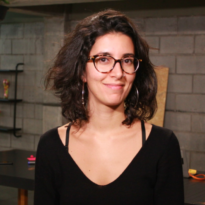2021 has arrived and the world is a very different place. How do we navigate this new landscape? At Echos we believe in empowering people to design desirable futures. For many of us, making decisions about how to create new futures can feel difficult when the world seems unstable and unclear.
To assist with moving forward we need different ways of thinking about the emerging future and to acquire new skills to help get us there. This is where the methods that form the practice of design thinking can help us build a new and better world.
A Post VUCA World
First, we need to understand the ways in which our perception of the world is changing. Futurist Jamais Cascio recently proposed that we need a new acronym to describe our post pandemic world. Until recently much of the world embraced an acronym borrowed from the cold war era military – VUCA. This stands for Volatile, Uncertain, Complex and Ambiguous. This acronym was widely adopted into businesses to guide agile processes and act as a general framework for sense making.
In 2020 the pandemic changed things forever. The way in which we create meaning in a new emerging world has shifted. Seeing the world as a series of threats that can be tactically maneuvered through has begun to lose relevance. VUCA existed to make sense of a complex world. The world of today feels like chaos. Cascio has offered a new framework, BANI to replace VUCA and create a sense of hope and empowerment.
The new acronym BANI can be broken down as follows:
B – Brittle: easy to shatter, subjected to a total and sudden failure. If something is brittle, it requires capacity and resilience.
A – Anxious: fear that any choice we make might be the wrong one. If we feel anxious, we need empathy and mindfulness.
N – Nonlinear: disconnection between cause and effect in time, proportion, perception. If something is non-linear, it calls for context and adaptivity.
I – Incomprehensible: extremely difficult, if not impossible, to understand. If something is incomprehensible, it demands transparency and intuition.
download: https://drive.google.com/file/d/18fy85qbC-cvuDbWty9_a429mt0si9KzB/view
How To Navigate In A BANI World
Moving forward people and business will need to move and behave differently in the world. They will also need to understand what skills will benefit us as we move forward.
The skills needed to navigate a BANI world described above are core competencies of the design thinking methodology. The following design thinking skills will become increasingly critical to solving problems and move into new desirable futures:
- Foster a growth mindset
- Practice empathy
- Adaptability
- Courage to imagine
The relationships between the design thinking processes above and the skills needed in the post pandemic world are explored in greater detail below:
Empathy:
Design Thinking is a human-centered approach that creates deep connection with users to understand their needs, behaviors and desires. This focus helps businesses understand what is most important for users when developing a new product, service or business. This means that empathy must be used to see the world from the customer or user’s point of view. Learning how to create and then apply empathy from the research phase to the completion of a prototype is critical for redeveloping products and services in the new world.
Growth Mindset:
The term ‘growth mindset’ was coined by Dr. Carol Dweck who said, “In a growth mindset, people believe that their most basic abilities can be developed through dedication and hard work—brains and talent are just the starting point. This view creates a love of learning and a resilience that is essential for great accomplishment.”
Design Thinking encourages a growth mindset through the process of experimentation and testing ideas quickly. The practice of experimentation helps us to consider failure not as something to avoid, rather as part of a process. It is a learning opportunity to keep improving products and services, with the goal of creating something that is desired by users. Failing fast through iterations enables teams to find solutions that work. In order to radically innovate, we must be willing to fail.
Adaptability:
When faced with uncertainty in the innovation context, experiments are the best way to quickly understand and adapt to new contexts. Experiments mitigate risk by testing our hypotheses in order to reach a customer solution fit and later a product market fit. Design thinking is an iterative process that embraces experimentation to test our assumptions. It invites us to strive for a valuable outcome rather than a predictable outcome.
Courage to Imagine:
Design thinking invites us to unleash a business’s creative potential by getting over fears that block creativity. It generates a trusting environment where a team feels comfortable sharing ideas. It provides opportunities to practice creative confidence through generating new ideas.
The Power Of Discovery
The most important part of learning new skills for a BANI world is practical application. If the world we are moving into requires new perspectives the best way to create them is through the process of doing. The most important part of design thinking as a practice is applying empathy and learning from field research to reframe a design challenge. This part of the process is called the discovery phase. This is where teams talk to people and observe their behavior. This process brings new ways of seeing the problem they are trying to solve.
This is when the most in-depth learning occurs and where sense making becomes important. If the world we are moving into is non-linear, we need to be able to think laterally and discover new connections that are emerging.
The Power Of Failure
If the world according to BANI includes incomprehensible as a core component, then accepting failure will need to feel natural. In a world divorced from design thinking, we tend to blame ourselves for failures. This goes along with a fear to share new thoughts or ideas for fear of being judged.
This behavior is limiting, creating missed opportunities to contribute and collaborate. However, in a world that embraces design thinking methodologies, discussing learnings from failures helps to guide us towards better solutions. Solutions tend to evolve when teams receive and take onboard feedback. These powerful transformations create personal shifts within individuals as they learn from failure and feedback sessions. Team members become more courageous, take risks, ask for feedback, make mistakes and learn from them. In a BANI world humility and vulnerability are very important to solving the complex problems ahead.
Learn More
The latest offering from Echos is Design Thinking Online is a self-guided learning experience that teaches the skills of a post pandemic world. This process delivers ten years of our learnings from teaching these methodologies. Over those ten years we have created teams of innovators around the world. Fresh mindsets and skills are needed to create new industries for the next normal of 2021. Learn more here or get in touch with questions, join us for Design Thinking Online in 2021!
—
Follow us on social
Instagram – Facebook – LinkedIn – Youtube – Spotify
How Can We Help?
- For training and Innovation Journeys in your company: check out our in-house course offering.
- For upcoming courses in your region: visit our website.
- For upcoming events in your region: look at our event calendar.
- If you have a special project and would like to use Echos’ consultancy services: send us an email.
- Want to speak to a real person? Call us on 1300 502 006










